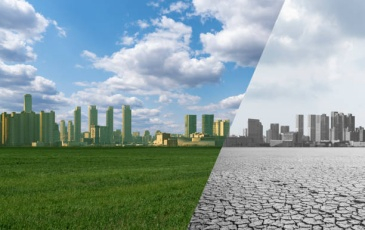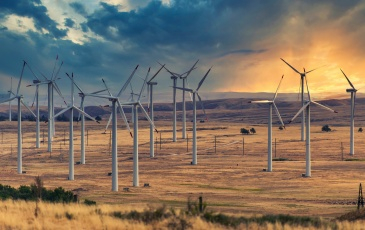California and China are influential global climate leaders with a history of working together on climate initiatives. Last April, California and China’s Ministry of Ecology and Environment signed a memorandum of understanding reconfirming their commitment to climate action and collaboration. The MOU explicitly mentions nature-based climate solutions as one of the priority areas of interest. While both jurisdictions are taking steps to integrate nature-based solutions in their climate goals and strategies, the pace and scale of action needs to be substantially increased to meet the climate commitments made in the 2015 Paris Agreement. This panel will share the many NbS happening in California and China, the ways policy and incentives can accelerate action, and how California-China collaboration on NbS can catalyze even greater global action.
Past Events
For a schedule of all our events, seminars, and lectures visit our calendar.
[In-person event]: COP27 Side Event: California's Subnational Climate Leadership
Through forward-thinking legislation, emissions standards, and other actions, California has made substantial progress over the past two decades in cutting its greenhouse gas emissions. California has consistently placed environmental policy at the center of the statewide agenda under both Democratic and Republican administrations. This event will explore California’s interagency-based regulatory framework to plan and execute climate action, the diverse funding sources it has tapped, and the example the state has set for both local and international partners. In addition, it will highlight the opportunities multi-state collaborations, like the U.S. Climate Alliance, present.
[In-person event]: COP 27 Side Event: Co-learning for Climate Action: University-led Collaborative Research Partnerships to Support Equitable Science
Universities are building meaningful partnerships with communities, governments and civil society to support co-learning and the development of integrated climate solutions that are just and sustainable. In the near-term, universities have strong roles to play to develop equitable solutions to meet urgent needs such as addressing methane emissions, energy transitions and implementation. This event will bring together leadership from various university-housed centers to share about their collaborative research partnerships and the impactful results of these joint efforts.
[Webinar]: Methane Webinar Series: Subnational Opportunities to Reduce Methane Emissions
Methane is responsible for about 20 percent of current global warming, and methane emissions continue to increase worldwide. Taking targeted action on reducing methane could avoid nearly 0.3 ℃ of global warming by the 2040s, thus providing more time to adopt more ambitious action to reduce greenhouse gas emissions. Subnational jurisdictions in both China and the United States are taking actions to control methane emissions. Both sides can learn from the lessons and experiences of one another, particularly on methane control policy-making and implementation. Join us to hear issue-experts from California and China to discuss these issues.
[Webinar]: Opportunities for Near-Term U.S.-China Climate Action: Tackling the Aviation and Maritime Transportation Sectors
Transportation is the largest source of greenhouse gas emissions in the United States, accounting for more than a quarter of annual emissions. In China, the sector accounts for nearly 10% of carbon dioxide emissions. Efforts to decarbonize the transportation sector are a key part of the climate strategies of both countries, with China leading on the deployment of electric vehicles. Meanwhile, some sub-sectors of transportation are notoriously difficult to decarbonize, including reducing emissions from flights, and from ships. What opportunities exist for the U.S. and China to help the difficult to abate aviation and marine sectors? We heard from issue-experts on opportunities for the U.S. and China in the coming decade.
[Webinar]: Opportunities for Enhanced Near-Term U.S.-China Climate Action: Eliminating Illegal Deforestation
At COP26 in Glasgow, more than 100 nations around the globe pledged to reduce deforestation by 2030 under the Glasgow Leaders’ Declaration on Forests and Land Use, including the U.S. and China. Meanwhile, under the U.S.-China Glasgow Declaration, the U.S. and China both agreed to prioritize eliminating illegal deforestation from their supply chains. What opportunities exist for the U.S. and China to help curb illegal deforestation? We heard from issue-experts on opportunities in the coming decade.
[Webinar]: Inside China’s National Adaptation Strategy 2035
Earlier this year, China released its new Climate Change Adaptation Strategy for 2035. It emerges from coordination across several national Ministries, and covers the effects of climate impacts like heat waves and flooding, as well as impacts on agriculture and food production, and supply chain management issues. Moreover, the Strategy aims to take a proactive approach to monitoring & warning systems for risk management, and preparedness to climate impacts across the nation. We heard from Chinese experts on what’s inside China’s latest strategy to adapt to the impacts of climate change.
[Webinar]: Integrating Nature-based Solutions into Subnational Climate Policies
We are currently facing two concurrent ecological crises: the urgent threat of climate change and rapidly accelerating biodiversity loss. Nature-based solutions - such as agroforestry, regenerative farming, and green infrastructure - are powerful tools which can confer both mitigation and adaptation co-benefits have largely been missing. We heard about the latest research calling for an integration of nature-based strategies into climate policies.
[Webinar]: Shenzhen's Decarbonization Story
Join the California-China Climate Institute and Shenzhen Research Institute of High-Quality Development and New Structure for insights into Shenzhen’s decarbonization story. Learn about Shenzhen’s carbon neutrality goals and efforts to advance transportation decarbonization. The session discussed incentives and institutional policies used to advance the municipality’s decarbonization pathway.
[Webinar]: China's Latest Climate Policy Updates
In recent years, China has made a number of announcements about its climate goals: emissions peaking by 2030 and carbon neutrality by 2060 among them. It has now issued policies to implement these goals in practice including a Mid-Century Long-Term Strategy and policy guidance and action plans on carbon peaking.










